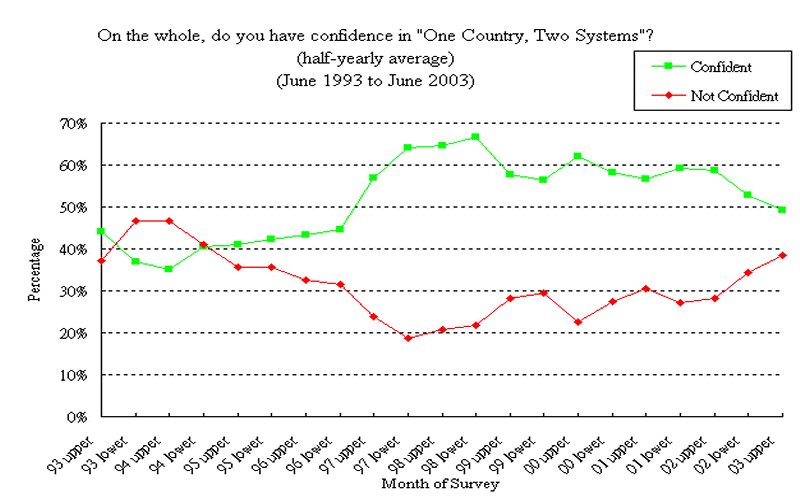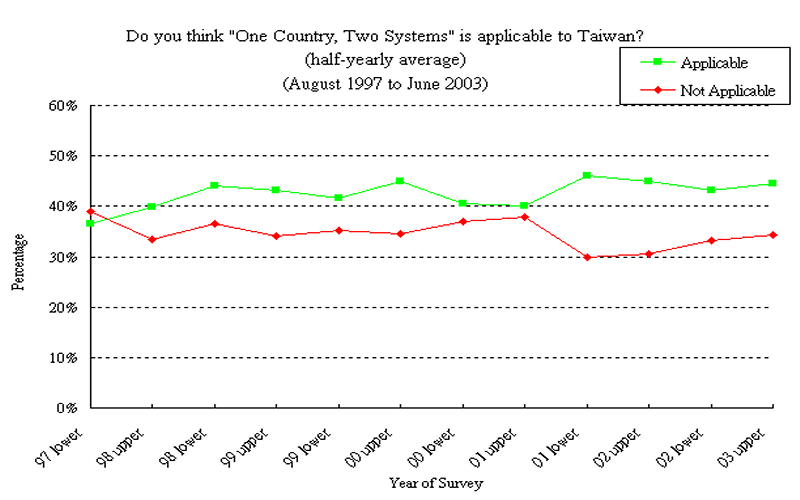Back
|
Robert Ting-Yiu Chung (Director of Public Opinion Programme, the University of Hong Kong) |
|
|
Translated by Calvin Chun-Kit Chan (Research Executive, Public Opinion Programme, the University of Hong Kong) |
|
|
Note: This article represents the view of the author and not the University of Hong Kong. |
|
|
The opinion poll series regarding "one country, two systems" began in June 1993, more than a decade ago. According to the findings collected so far, Hong Kong people's receptiveness of "one country, two systems" over the past 10 years could be divided into three stages. Stage One would be the 4 years from 1993 to 1996, when the confidence and no-confidence levels wrestled with one another between 35% and 45%, probably a result of the fierce wrangle between the Beijing and British Governments before the handover. It was a time when Hong Kong people were generally not quite optimistic about the future of "one country, two systems". When the negotiation regarding Hong Kong's post-handover constitutional development finally broke down, the public's confidence fell to a trough of 32% in April 1994. It was only after such quarrels died down, with both sides promising to do things their own ways, that people's confidence gradually recovered, from 35% registered in the upper half of 1994, to 45% in the latter half of 1996. |
|
|
The second stage started from the first half of 1997, to the latter half of 1998, during which people's confidence grew significantly, from 45% to 67%. Interestingly, although a series of events erupted one after another during this period, such as the financial turmoil in Asia, the bird-flu attack and the new airport chaos, which somewhat weakened people's support to the SAR Government, people's confidence in "one country, two systems" remained unscathed, and the positive figure kept rising, until the first half of 1999. |
|
|
Sadly, in May 1999, in order to settle the right of abode issue, the SAR Government decided to reject the Court of Final Appeal's ruling, and officially sought for the interpretation of the relevant articles of the Basic Law by the Standing Committee of the National People's Congress, thereby giving a new reading of the "one country, two systems", and put people's confidence on a slippery slope. From 1999 to 2003, the general public's confidence in "one country, two systems" has been fluctuating downwards, from 67% to 49% registered in the first half of 2003. |
|
|
A crucial turning point in people's confidence in "one country, two systems", the interpretation of the Basic Law in 1999 revealed some deep-rooted problems. First, the incident was brought out by Tung's core in the SAR, not the Central Government. Of course, when the incident was lifted to the political and sovereignty level, the Central Government had no choice but to side with Tung. Second, this incident actually relates to the freedoms and the rule of law so much treasured by Hong Kong people, the SAR Government made a wrong move by resorting to economic arguments. Third, the primary responsibility the downturn of people's confidence after 1999 lies not in Beijing but in Tung and the local wing. Looking ahead, the future development of Hong Kong people's confidence in "one country, two systems" depends on the following factors: |
|
|
(1) |
Whether the SAR leading team can strengthen the deep values so much treasured by the people in Hong Kong, such that the advantages of "two systems" can be exploited as fully as possible. |
|
(2) |
Whether the SAR Government can reduce the chance of making blunders when pursing and implementing policies, so as to retrieve people's support in general. |
|
(3) |
Whether the SAR leadership core can come to terms with the fact that the current political deadlock will not be easily solved merely by boosting the economy, while the government should also take good care of people's demands, including those asking for a constitutional reform. |
|
(4) |
Whether the Central Government can sit back and let Hong Kong people solve their own problems, when it comes to SAR affairs. |
|
(5) |
The development of Mainland China itself, especially its progress in political reform. |
|
Should the above factors develop positively, Hong Kong people's confidence in "one country, two systems" would undoubtedly be on the rise. This would not be easy, considering Tung's habitual reliance on the support from the Central Government, as well as his "responsibility" to return favours, making him practically impossible to say "no" to the Beijing leaders. Should the Central Government be able to take a tolerant and open-minded approach in dealing with the political demands of Hong Kong people, and give more room to Tung, or even ask him to bring in some democrats in order to cohere the different strata of society, the SAR Government could then regain people's confidence, and their approval to "one country, two systems" would also be strengthened. |
|
|
According to the regular tracking polls conducted by the author after the handover, there are generally 40% to 45% of Hong Kong people who believe that "one country, two systems" is applicable to Taiwan, consistently more than those who hold the opposite view. Such a trend seems to be somewhat at odd with the fluctuations of Hong Kong people's overall confidence in "one country, two systems". This may reflect Hong Kong people's ignorance of the Taiwan society. |
|
|
Between 1993 and 1994, the proportion of Hong Kong people who trusted the Taiwan Government once reached 40%. At that time, less than 25% trusted the Beijing Government. However, after the handover, the trust level for the Taiwan Government dropped to less than 10% after 2000. On the other front, people's trust in the Beijing Government began to climb in 1999, and almost reached 50% in 2001. Along with the greater trust in the Central Government, Hong Kong people's confidence in the ultimate reunification across the strait also increased, from 35% in the first half of 1999 to around 50% recorded in recent years. Apparently, the general public has started to accept Beijing Government's views on cross-strait issues. |
|
|
The serious lack of communication between peoples in Mainland China, Hong Kong and Taiwan is indeed detrimental to the development of all three regions. The post-handover SAR Government has been rather inflexible in handling its relation with the Taiwan Government, it asks for permissions from the Central Government before making every single move. On this front, the Macau SAR Government is much wiser than the Hong Kong SAR Government. |
|
|
On the other hand, it is also wrong for the Taiwan Government and its people to regard the post-handover Hong Kong simply as a part of Mainland China. Among all Chinese communities, Taiwan is most advanced in terms of democratic development, which is commendable. Nonetheless, Hong Kong society's compliance with the rule of law, and its triumph over corruption, out-performs Taiwan and Mainland China. Both being affluent, civilized, open and free societies, Hong Kong and Taiwan are well posed to become role models for developing Chinese societies. |
|
|
The problem of cross-strait reunification will continue to bother the peoples in Mainland China, Hong Kong and Taiwan. Resolving the problem requires time and patience. Separations and reunifications often go in cycles. The establishment of the United States of America and the European Union are two good examples of cultural integration. Taiwan people fears that cross-strait reunification would cost them democracy and human rights, this is perfectly understandable. While observing political development in Mainland China, Taiwan people continues to localize and internationalize themselves, this is also very reasonable. Similarly, Hong Kong people's effort to strive for freedom and democracy under "one country, two systems", and their unshakable adherence to align themselves to the world, should also be applauded by the governments and peoples across the strait. Unification and localization do not necessarily contradict each other. Cultural diversity and multi-directional communication are both important elements of the modern world. If benign interactions remain to exist across Mainland China, Hong Kong and Taiwan, and their peoples continue to excel themselves, there is no rush to settle what need not be settled. History will carve its natural course. |
|
Chart 1: Hong Kong people's confidence in "one country, two systems"

Chart 2: Hong Kong people's view on whether "one country, two systems" is applicable to Taiwan
